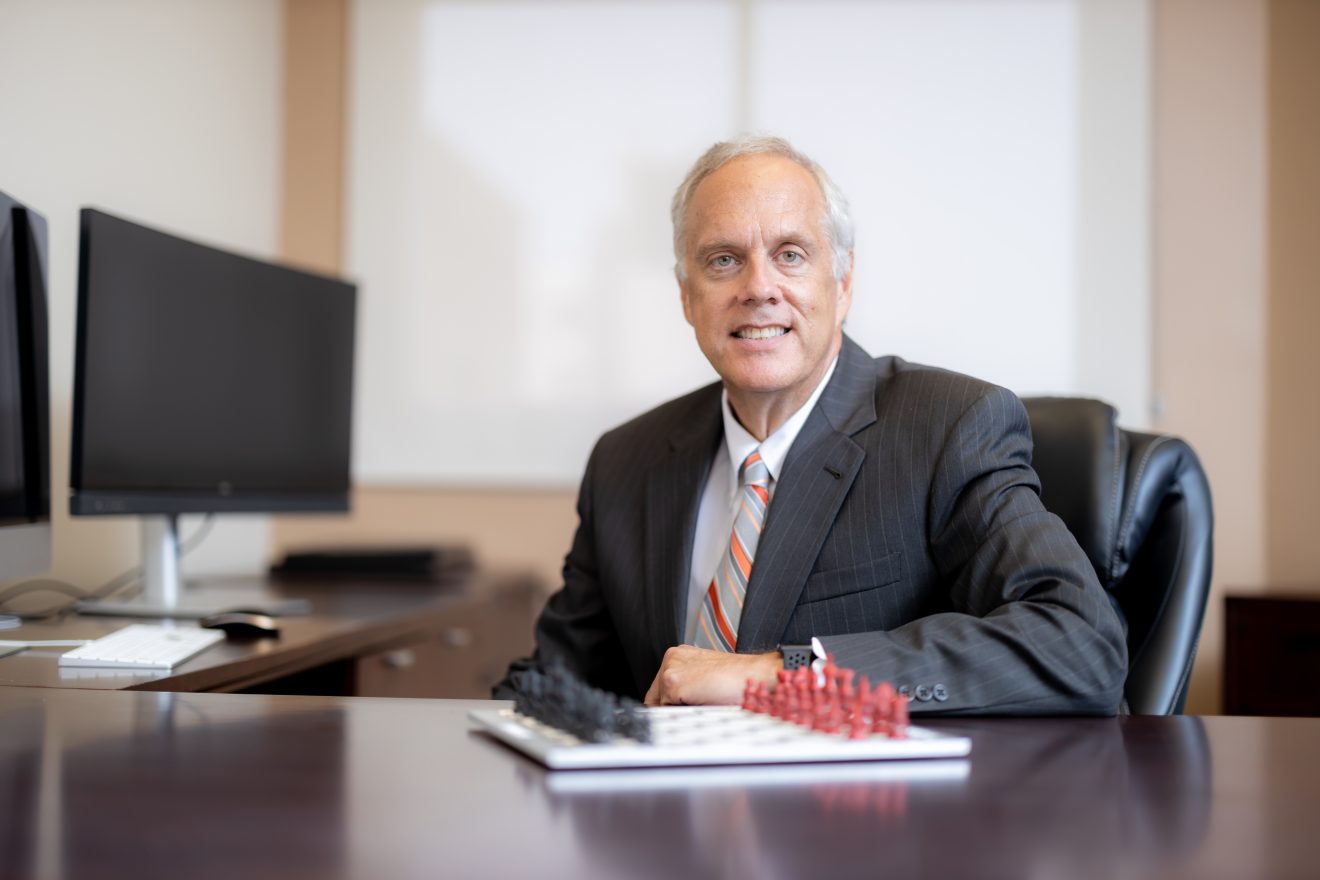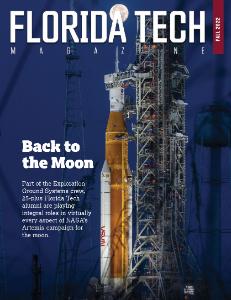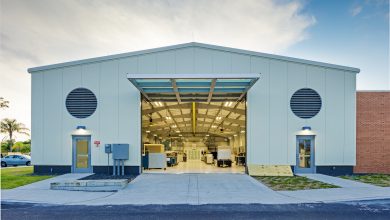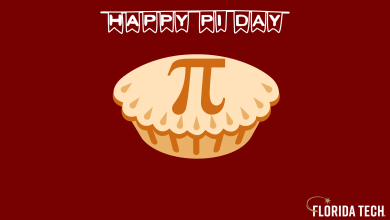Opening Moves: New COES Dean Brings Strategy for Success to Florida Tech
By Karly Horn and Adam Lowenstein
Hanging on the otherwise blank walls of John Harris’1Family Life: Born and raised in Holmdel, New Jersey; The fifth of seven sons with a father who was a civil engineer; Two children who turned out very different: Noah graduated in spring 2022 from UF with a degree in the classics and is now teaching high school Latin. Maya is a computer science Junior at UF; Wife: Wendy Huang, an experienced software developer. new top-floor office in the F.W. Olin Engineering Complex is a movie poster for the 2003 documentary film “Game Over: Kasparov and the Machine.”
The movie is about Garry Kasparov, the highest-rated chess player in history at the time, his initial victory and eventual loss to IBM supercomputer Deep Blue—the first loss by the human world champion to a computer.
The new College of Engineering and Science (COES) dean brought the poster with him from his last job as electrical and computer engineering department chair at the University of Florida (UF) because it depicts several of his interests: computers, artificial intelligence, a mind deep in thought and, yes, chess.
An avid, lifelong chess player2Chess Champ by the Numbers: 1710 – Harris’ U.S. Chess Federation rating; 50 – Master’s and Ph.D. students honored the then Gator Chess Club advisor with a 60th birthday gift: the inaugural John G. Harris Chess Tournament Feb. 19, 2022; 1 – course he taught on The Queen’s Gambit, discussing the book, exploring chess game details and strategies that parallel those in the book and the Netflix mini-series, and playing in-class games; better than 75.9% of 2-minute “Blitz” game players on Lichess—Challenge him: johngharris! and researcher of the brain and neural systems, Harris sees the game as both a mind-sharpening pursuit and an analogy for several of life’s more complex components.
Of course, problem-solving and strategy are key, he says, but also the ability to read people, anticipate another’s moves and, ultimately, invest the time and effort required to succeed.
These skills have served him well in his professional career and will continue to guide his vision and leadership as he considers his opening moves as dean.
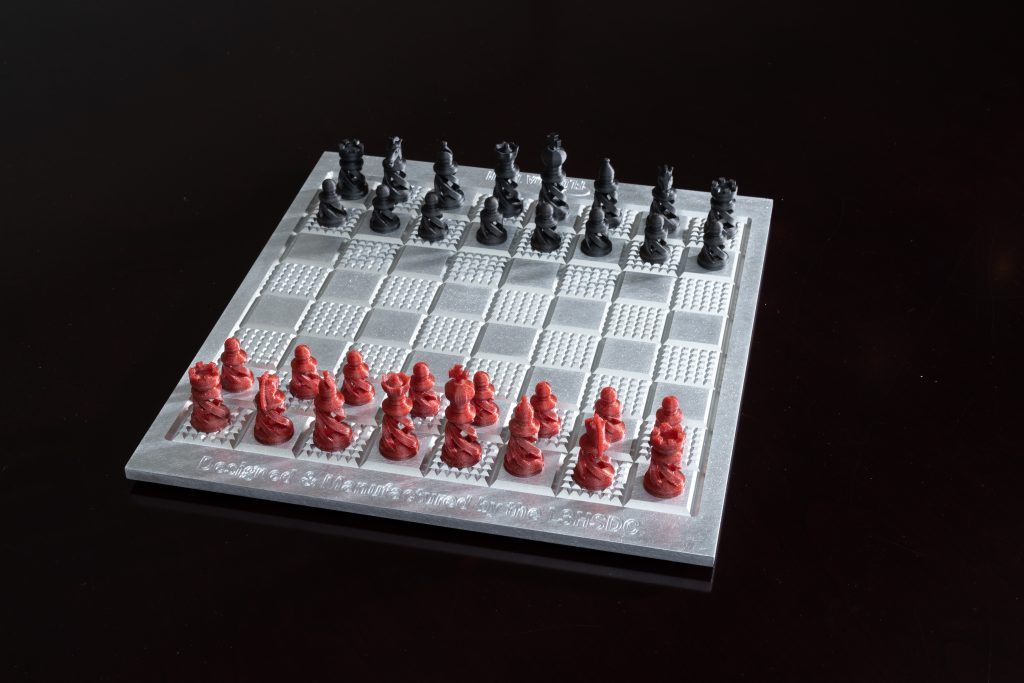
Harris spent 29 years at UF, the Gainesville institution with more than 53,000 students, including the last 11 years as department chair. He arrived in the Sunshine State after earning his bachelor’s and master’s degrees in electrical engineering at Massachusetts Institute of Technology3He later returned as a postdoctoral fellow at the MIT Artificial Intelligence Lab. and his Ph.D. in computation and neural systems at California Institute of Technology.4A program co-founded by Nobel Prize-winning physicist and Caltech faculty member Richard Feynman.
With its small size—a total student population of about 2,400—and more focused educational offerings, Caltech is “most similar” to Florida Tech, Harris says.
“One of the things I took away from Caltech was the commitment to excellence they have. To me, it’s excellence and impact that I want to bring to Florida Tech,” he says. “I want to make Florida Tech the Caltech of the east. We have a lot of work to do.”
Already, the university has what Harris calls “pockets of excellence5Pockets of Excellence: 1) Aerospace – Our roots. Current research: space commercialization, flight test engineering, space robotics, fluid dynamics—to name a few. 2) Marine Sciences – Flanked by the Indian River Lagoon and Atlantic Ocean, field research abounds for oceanography, marine science, ocean engineering and climate science students and all marine-minded individuals. 3) Cybersecurity – Program has doubled in the last three years; FITSEC competition team is ranked No. 2 in the national Cyber Power Rankings. 4) Biomedical/Health Sciences – Rapidly growing program evidenced by the new Gordon L. Nelson Health Sciences building and the state-of-the-art equipment it houses.,” and he is eager to work with executive vice president, provost and chief operating officer Marco Carvalho and other university leadership to implement a shared vision.
What does that vision look like? At COES, it looks like a college with built-in advantages that now must take the next step.
Excellence in teaching, smaller class sizes, hands-on learning, a top-notch senior design program, active engagement of everybody—that’s important and different.”
John Harris, Dean, College of Engineering and Science
That means moving up in the rankings6No. 202 Best National University, U.S. News & World Report; No. 7 (out of 50) Most Underrated College in America, Business Insider; No. 4 Florida University, Wall Street Journal/Times Higher Education.— from U.S. News & World Report, for one.
“Even though there are questions about how rankings are determined, people pay attention to them. Faculty, Ph.D. students when looking for a school, undergrads—every which way, people look at rankings. Even employers consider rankings,” Harris says. “Rankings by themselves are not important, but all of these rankings are based on metrics that matter7Metrics That Matter: In addition to several others and varying by ranking organization, rank-boosting factors to focus on include 1) Externally funded research 2) Faculty awards, publications and citations 3) Alumni giving 4) Graduation and retention rates 5) Academic reputation. very much.”
Annual department research expenditures surged more than 150% over Harris’s tenure as department chair at UF, approaching nearly $24 million. That is the seventh largest expenditure among all electrical and computer engineering departments in the U.S.
“Florida Tech is poised to expand its research program, also,” he says. “I see a great opportunity to make an impact.”
Particularly, as a joint engineering and science college, Harris says.
I joke that 1 + 1 = 3. Combining different disciplines together creates something that is more than the sum of the parts. You get an additional benefit from that kind of interaction. Not many other places offer that combination.”
John Harris, Dean, College of Engineering and Science
Florida Tech is one of few universities in the country that combines engineering and science within the same college and department, i.e., chemical engineers are with chemists; biomedical engineers are with biologists; and aerospace engineers are with space physicists. Another: Caltech.
In fact, Harris’ Ph.D. in computation and neural systems is interdisciplinary, combining elements of neuroscience, electrical engineering and computer science. He aims to develop further synergy by encouraging scientists and engineers to work more closely with the other academic colleges, like the Nathan M. Bisk College of Business.
Florida Tech’s location amid the burgeoning aerospace industry excites Harris, too. He did alumni outreach8Get involved with your alma mater: Teach a class as an adjunct faculty member; Recruit Florida Tech graduates; Start or participate in an internship/mentorship program; Provide feedback from your industry; Collaborate on curriculum and research; Participate in Florida Tech’s Day of Giving Nov. 10, 2022. and company visits at UF, but Gainesville is not as heavy with industry as the Space Coast.
“I’m really looking forward to that difference at Florida Tech. Given all of the companies around, there can be more involvement.”
But first on Harris’ to-do list: listen.9Dr. Harris wants to hear from you! Which majors and what kinds of skills are necessary to succeed in your field and/or at your company? In other words, what gaps can we fill? Submit your response.
“My leadership style is to not make decisions without inputs,” he says. “I will talk to as many faculty, staff, undergraduates, graduate students, alumni and industry leaders as possible—figure out what things are slowing us down at Florida Tech, and what can be improved.”
One of Harris’ priorities is developing students who are more than just excellent engineers and scientists.10Outside the Classroom: Dr. Harris wants to develop well-rounded students by encouraging résumé-building activities like 1) Bisk College of Business courses in leadership, entrepreneurship and innovation 2) Internships and co-ops with local industry 3) Participating in clubs and competition teams, like FITSEC Cybersecurity, Panther Robotics, Concrete Canoe, Esports and Athletics. They need to be exposed to topics and areas they may not normally explore, from data science to communication, he believes.
“To keep up with what’s going on in society, in industry, in research, we need to prepare students for going out into the real world,” he says. “That is a shortcoming at many, many schools—not enough emphasis on new things that are happening.”
Like a chess pawn sacrificed, so, too, in life—and academics—are some of the best moves counterintuitive, he says.
Closing the textbook. Taking a class outside of the COES. Swapping study time for extracurriculars.
While they may not directly impact GPAs, these things develop students’ emotional IQs, hone their abilities to relate to others and work in teams and, in short, cultivate their humanity. Because ultimately, people hire people—not GPAs, résumés or machines, Harris says.
In the end of the documentary, the machine defeated Kasparov. He lost a chess match, but he gained an important perspective.
“Machines have calculations. We have understanding. Machines have instructions. We have purpose. Machines have objectivity. We have passion,” Kasparov said years after the match during his TED2017 speech. “… Our humanity is not defined by any skill, like swinging a hammer or even playing chess. There’s one thing only a human can do. That’s dream.”
For Harris, that dream includes a stronger, better Florida Tech—well-rounded students; passionate, thriving faculty; transparent, insightful leadership; deep-rooted community connections; and most important, constant growth that means for him, the game is never over.
This piece was featured in the fall 2022 edition of Florida Tech Magazine.

